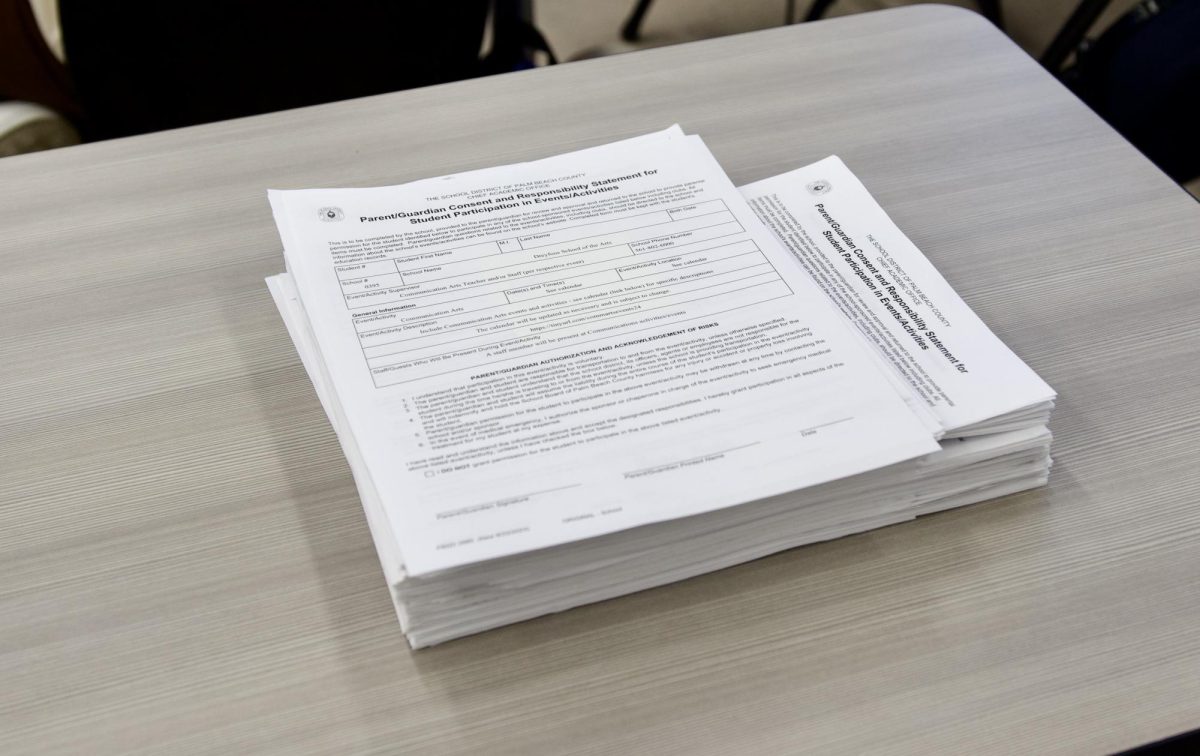Across campus, students have been turned away at their club’s doors, for what could be an infraction of state law. The school rule broken? These students had forgotten the parental consent forms now required for school-sponsored activities, ranging from club meetings at lunch to after-school events.
The School-Sponsored Events and Activities Bill was passed in July, setting the administrative rule into motion in K-12 schools throughout Florida.
According to the Florida Department of Education, the bill “protects the innocence of students by ensuring they are not exposed to inappropriate school-sponsored events and activities.”
The School District of Palm Beach County’s response to the bill is requiring parental consent forms for club officers, art area deans, and other sponsors of extracurricular activities to hand out.
This has given additional duties for club presidents, such as Passion for Paws club president and communications sophomore Gabriella Escobar.
“Being a first year club president, it’s been kind of a hassle to get all of the members to sign [the form], especially since we have about 60 (members),” Escobar said.
Students involved in many clubs need to get documents, for each, signed by their guardians. According to Testing Coordinator Sarah Ray, the administration was notified they had to implement the forms from the district less than a week before Club Rush.
“We had so many questions for the district that we decided to go ahead and do Club Rush before telling the sponsors,” Ms. Ray said. “We didn’t know exactly what needed to be done.”
In presenting these additional rights to parents, Florida legislators have brought change to long-held school systems. It is yet to be seen how these bills will affect the student body in the long-term: but for now, it has introduced an added step for anyone who wants to be involved in school events. For some students, constantly asking their parents to fill out forms feels excessive.
“My mom’s probably annoyed with, like, ‘Can you please sign this for me? Can you sign this for me?’,” communications sophomore Bianca Angelino said. “Just coming home every day being like, ‘Yeah, Mom, I have another form.’”
The laws instituted by Florida’s “Parental Bill of Rights” may reach beyond just club meetings – some majors, such as communications and band, need to sign an overarching consent form to attend all after-school events.
“In general, it’s definitely been a hassle,” band freshman Johanna Daugherty said. “Every single after-school event that I attend, I have to give a consent form.”
The forms can present barriers for students in particular activities when their parents don’t approve. The bill allows parents to opt out of their child’s club meetings, rehearsals, volunteer events, and other after-school activities – possibly limiting their student’s ability to participate in activities they otherwise would.
“There’s a certain group of parents that feel very strongly about how children should be raised,” Daugherty said. “They feel like they have the right to force it onto everybody else, and that’s why we’re getting things like parental consent forms.”
With school districts across Florida instituting similar forms, the parental consent system is here to stay. For the many students involved in clubs and extracurricular activities, asking guardians to sign forms may become part of the high school routine in the years to come.
“Education isn’t just about what the parents want,” communications freshman Mabruk Alam said. “I feel like it’s something students want, too.”

























































![[BRIEF] The Muse recognized as NSPA Online Pacemaker Finalist](https://www.themuseatdreyfoos.com/wp-content/uploads/2025/03/IMG_2942.jpeg)
